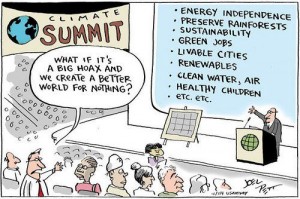The Many Shades of Green
by aintveld | September 19, 2012 5:30 pm
By ASHLEY INTVELD
The Republican presidential candidate stood in front of thousands of supporters to criticize his opponent’s environmental record.
“President Obama promised to begin to slow the rise of the oceans and heal the planet.” Mitt Romney paused to let the laughter resonate. He raised his brow, looked left, then right, and smirked as the audience fell to silence once more. “My promise is to help you and your family,” Romney told the expansive audience at the Republican National Conference[1] on Aug. 30 in Tampa, Fla.
Romney’s now infamous quote has stirred debates nationwide regarding the candidates’ promises to the American people for the upcoming November elections. Citizens are prioritizing the nation’s most critical concerns, which teeter anywhere between the national unemployment rate, currently 8.1 percent[2], and global environmental crises[3].
Preceding the hottest summer in recorded history, many environmentalists are focusing primarily on the need for alternative energy to reduce carbon emissions which deplete ozone. Although both candidates acknowledge the urgency in renewable energy venues, the prioritization of where this incentive lies has stirred debates.
One New Jersey voter sees these issues as one in the same. Butler resident Keith Loria said, “If the environment that we live in becomes uninhabitable, the president won’t exactly have a country to watch over. If we gear our focus toward cleaning up the environment, jobs will be created in that field.”
During President Obama’s term, the wind and solar-powered community has doubled in size. However, with the uncertainty of the election’s outcome and whether the tax credit is renewed, the American Wind Energy Association[4] has estimated a staggering 37,000 jobs[5] to be cut due to dropped investors. The Production Tax Credit, created under the Energy Policy Act of 1992, permits an income tax credit of 2.2 cents/kilowatt-hour for electricity produced from a renewable source. “Franklin D. Roosevelt’s New Deal proposed the CCC[6] which was formed to create jobs for the unemployed in developing and conserving natural resources,” Loria added. “It worked once and it can work again. Sometimes we need to look back to our roots to get the world growing again.”
 [7]
[7]Environmental student Bobby Nowatnick voiced his own concerns regarding the apparent ecological apathy in Romney’s quote.
“If Romney wants to ‘help you and your family,’ the best way to do that is to start saving the place where they live,” said Nowatnick.
“I would compare it to whales. When whale populations began to decline due to over-hunting and pollution, we didn’t say, ‘We’ll just give healthcare to the whales and take better care of them.’ We set up safe zones in the oceans where whales can be safe and protected,” added Nowatnick. “The Earth is our home, it’s about time we protected it.”
In an effort to ensure environmental “safe zones” for Americans, President Obama proposed his intentions to uphold the EPA’s ability to regulate greenhouse gas emissions and uphold hydraulic fracturing[8] guidelines, which aim to regulate the waste disposal of flowback matter as well as the injection of fracturing fluids into the ground;both of which pose potential risks to the environment. Romney, however, says he intends to lift the EPA’s control and permit individual states to take on that role.
Although these concerns are considered important, some voters feel the future president’s priorities should not be set primarily on environmental issues.
“Mitt Romney’s statement is a realistic one. He is not saying that the environment is unimportant, but that we have bigger issues to tackle first,” said Sussex County resident Nicole Novakoski. “I absolutely believe that the environment should be a significant concern for the president; however, I believe that every single one of the president’s concerns should be significant.”
In 2012, the EPA received $9 million[9] for environmental research and development of eco-friendly products and innovations from tax payers’ money. “More people working and a growing or stable economy will produce more tax revenue to be divided amongst different agencies,” said Novakoski. “It is then that environmental issues can move up the list of immediate concerns.”
Is the answer to our economic strife an echo of an environmental resolution? With November elections approaching, American voters will weigh their priorities: go green, or make green?
- Republican National Conference: https://www.youtube.com/watch?v=GbkYBGVVpSc
- 8.1 percent: http://data.bls.gov/timeseries/LNS14000000
- environmental crises: http://www.washingtonpost.com/postlive/obama-vs-romney-where-their-energy-policies-differ/2012/09/10/2b6c9e56-f9c8-11e1-a945-6cd36411d000_story.html
- American Wind Energy Association: http://www.awea.org/
- 37,000 jobs: http://www.huffingtonpost.com/tom-zeller-jr/mitt-romney-energy-plan_b_1828378.html
- CCC: http://www.ccclegacy.org/
- [Image]: http://class1.ramaporecord.org/2012/09/19/the-many-shades-of-green/political-cartoon/
- hydraulic fracturing: https://www.youtube.com/watch?v=dZe1AeH0Qz8
- $9 million: http://http://www.nytimes.com/gwire/2011/02/14/14greenwire-epa-budget-proposal-focuses-on-air-and-climate-79655.html?pagewanted=all
Source URL: https://class1.ramaporecord.org/?p=7974